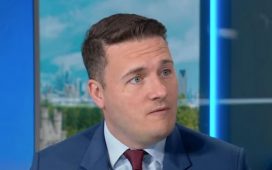In June 2014, the Conservative party won an unexpectedly comfortable victory in the Newark byelection. It was a triumph for David Cameron over Nigel Farage, who had spied an opportunity to install the first Ukip MP. The winner, and the face of Cameron’s success, was 32-year-old Robert Jenrick.
Ten years later, in May 2024, as he prepared to position himself for the Conservative leadership after Rishi Sunak’s impending election defeat, Jenrick said that were it up to him, he would gladly welcome Farage into the fold.
“I would have no problem with him being a member of the Conservative party,” Jenrick told Sky News. “I want the Conservative party to be one which is the natural home for anyone who shares my determination to tackle issues like illegal and legal migration.”
It’s a remarkable transformation. Those who know Jenrick – who has mounted an unflinchingly rightwing campaign to become Conservative leader – say that for most of his political career he was a middle of the road Tory. “He was a full-fat subscriber to David Cameron in 2014,” said Anna Soubry, who was a neighbouring Tory MP and heavily involved in his byelection campaign. “He trims his sails to suit whichever political wind is blowing within the Conservative party.”
Last week, Jenrick held a launch event in his constituency where he put cutting migration at the centre of his pitch. This week, he was widely criticised for saying that any protester who shouts “Allahu Akbar” should be arrested – seen by many as a deliberate attempt to ingratiate himself to Tory members who are sympathetic to Farage and Reform. “He is the credible face of Reform-leaning Conservatism,” said a Tory centrist who lost their seat this summer.
Colleagues of Jenrick, a former corporate lawyer who studied at Cambridge, say he has always been extremely ambitious. After university, he worked as a solicitor in London and Moscow, during which time he met his wife, Michal Berkner, a high-flying American lawyer specialising in mergers and acquisitions. “His heart was never in commercial law. I think it was always in politics,” a Tory MP who has known Jenrick for more than a decade said. The couple’s extensive property portfolio became a focus during the 2014 byelection campaign, at a time when Cameron and his party were accused of being out of touch.
Jenrick’s political career took off after he endorsed Boris Johnson in the 2019 Conservative leadership contest, for which he was rewarded with the role of housing secretary. Quite quickly afterwards he was engulfed in scandal over his decision to approve a £1bn property development proposed by Richard Desmond against the advice of officials. The pair had recently sat next to each other at a Conservative fundraiser, where Desmond showed Jenrick a video of the proposed development on his phone. The controversy did not immediately end Jenrick’s cabinet career, but he faced further difficulties – including allegations that he broke lockdown rules to visit his parents in April 2020 – before he was eventually sacked in September 2021.
When Sunak became prime minister in October 2022, he made Jenrick immigration minister on the basis that he was a loyalist who could keep an eye on the then troublemaking home secretary Suella Braverman. A Tory strategist who has worked with Jenrick said he was “sent in to watch Suella to make sure she didn’t do anything too stupid”. In the early days, they said, Jenrick had “a conduit to Rishi and would speak to him in a much more informal way than Suella could”.
Relations between the PM and Jenrick deteriorated, however, as the minister began to lobby No 10 on migration and sign joint letters with Braverman suggesting policy solutions. “He soon got on the same page that Suella was on. He didn’t necessarily understand it in the same way at the start but quickly got to grips with it, and started to lobby quite hard with Rishi in terms of cutting [immigration] numbers,” the strategist said.
By the spring of 2023 Jenrick – who at first had distanced himself from Braverman’s language on immigration – began to use increasingly incendiary rhetoric. In a speech to the thinktank Policy Exchange he said uncontrolled migration “threatens to cannibalise” British compassion and that the “lifestyles and values” of people arriving via small boats over the Channel threatened social cohesion. A few months later, he was strongly criticised for ordering the removal of a mural depicting cartoon characters inside an asylum seeker reception centre to welcome children.
Nickie Aiken, a former Tory MP, said she was “struck by his grasp of issues across his portfolio and how politically astute he was” when they worked together first in the housing department and later on her backbench campaign to repeal the Vagrancy Act. “I was quite surprised how militant he became as immigration minister as he has always been centrist … I did ask him about why he had become so hardline and he explained very clearly that once he got into the weeds, he realised how broken the system was and that it needed full-scale reform,” she said.
When Braverman was sacked in November 2023, Jenrick was not chosen to replace her. He quit the next month, accusing Sunak of not going far enough on immigration. His exit was seen as laying the groundwork for an eventual leadership bid. As the year turned, he lost weight and got a close-cropped haircut, prompting speculation in Westminster that he had had a “glow-up” ahead of his leadership pitch.
Not all Conservatives buy the new Jenrick. One adviser on the right of the party said Jenrick did not “have a rightwing bone in his body”, but was in fact a “parody-level Cameroon blandy” whose real base in the party were “Christian-centrist dads like John Glen”. They added: “He does deserve respect for simple political nous here – he saw that this wreck wasn’t worth clinging to, and that within less than a year he was going to have to try and make a case for himself.”










